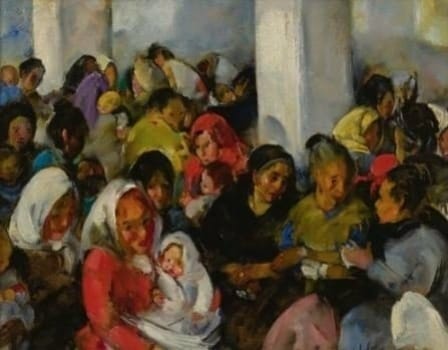American Jewry is at a crossroads. Gone are the days of glaring contradictions and discernible tensions; the fateful choice between American and Jew; the tortured dance back and forth between the two for those who chose both or those who chose not to choose at all. To be an American Jew in this moment in American history–one whose socioeconomic and political forces threaten to swallow religious identities whole–is difficult only insofar as one is unwilling to accept the hollowed, instrumentalized conceptions of American citizenship and Jewishness that are currently in vogue. Materially, it has never been easier to be Jewish and American; 54% of American Jews earn incomes $100,000 or greater, compared to 19% of the U.S. adult population. Antisemitism in the United States, despite concerning relative increases associated with the Israeli-Palestinian conflict, continues to sustain historical and global lows, especially in comparison to other Western countries. Internally, robust Jewish philanthropic and nonprofit ecosystems–many constituents of which are beneficiaries of funding from federal and state governments–provide everything from subsidized Jewish education to free trips to Israel. There is, to borrow from the great American Jewish poet and visionary Muriel Rukeyser, no torment in this gift–that is, if one cannot see it.
And yet the torment remains. For American Jews attuned to the finer resolutions of the human spirit, or the finer intricacies of our deep textual and oral traditions–or both–this moment is one of crisis. That undeniably yet ineffably Jewish impulse to interpret ourselves to ourselves, to make meaning of our lives, is drowned in a circling, torrent-like discourse of Jewish peoplehood and continuity. What of responsibility, of justice, of redemption? The impenetrably deep reserve that is the Jewish tradition is mined for its relevance to the issue of the day, its raw material flattened and polished until it is politically expedient and Instagram-ready. All who point to inconvenient, contradictory products of the mine–or even the heterogeneous nature of the mine itself–expose themselves to accusations of betrayal, or worse, self-negation. What of depth, of complexity, of truth? Worst of all, our faith is invoked to justify violence and human indignities the likes of which our ancestors bore silently so their children would not so much as imagine that such horrors were possible. How, now, are we the ones who inflict horrors? If the echoes of Rukeyser’s words don’t all reach this moment, this line can only but scream in our ears: “and God / Reduced to a hostage among hostages.”
To their credit, established Jewish media outlets have opened their platforms to American Jews who bear these burdens on behalf of their cherished traditions. Their voices, small only in number, ring out like those of prophets. But even they must share space with other writers who defend positions that would disturb any person of religious conscience, and are certainly beyond the pale of any normative Jewish ethical tradition. In placing–however implicitly–these writers in conversation with those committed to the Jewish religion’s ideals of compassion, humility, and lovingkindness, the conversation itself loses moral weight. A view expressed with the language and urgency of the prophetic becomes a mere side in a public-facing debate, adjudicated by the masses. It is time for a publication whose bounds of discourse are set not by public opinion or algorithmic predictions, but by the discipline of the moral imagination. It is time for a public forum founded not upon the fear of dissent, but upon the love of truth. It is a time for a sanctuary.
Sanctuary aims to generate a new American Jewish discourse by framing our inquiries in the language of our tradition–a language that transcends the arbitrary, categorical distinctions of contemporary politics and public life. Conversely, and simultaneously, we seek to invigorate the American Jewish conversation by interweaving ethical and religious thinking with the nuances of academic, literary, artistic, and scientific disciplines. Above all, we intend to restore the spirit of our multivocal, complexity-embracing heritage to public debate. This is an ambitious project. It also could not possibly be more needed in this moment.
What could the American Jewish conversation on our most contentious issues–from Israel-Palestine to Jewish education–look like without reactivity and ideological purism? What connections–across international borders, Jewish denominations, forms of faith and practice–might be possible? What new light might be shed on texts, old and new, Jewish and otherwise? It is not upon us to complete this work; nor can we absolve ourselves of its great responsibility. The words of those who came before us call to us like sentinels of an unwritten future, beckoning us to begin.
But the accepting wish,
The whole and fertile spirit as guarantee
For every human freedom, suffering to be free,
Daring to live for the impossible.
-Muriel Rukeyser, “To be a Jew in the Twentieth Century”

